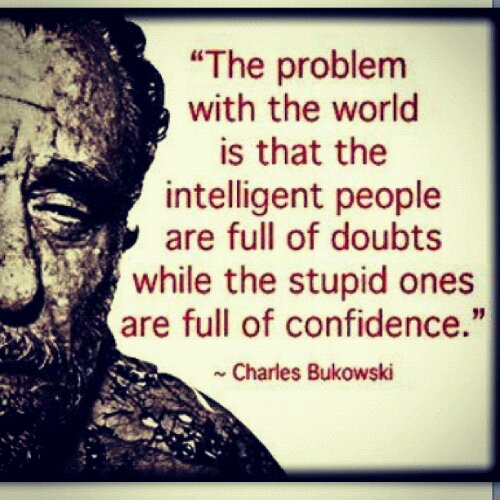“There are two kinds of people, those who do the work and those who take the credit.
Try to be in the first group; there is less competition there.”
– Indira Gandhi


“There are two kinds of people, those who do the work and those who take the credit.
Try to be in the first group; there is less competition there.”
– Indira Gandhi

A woman was waiting at an airport one night, with several long hours before her flight. She hunted for a book in the airport shops, bought a bag of cookies and found a place to drop.
She was engrossed in her book but happened to see, that the man sitting beside her, as bold as could be. . .grabbed a cookie or two from the bag in between, which she tried to ignore to avoid a scene.
So she munched the cookies and watched the clock, as the gutsy cookie thief diminished her stock. She was getting more irritated as the minutes ticked by, thinking, “If I wasn’t so nice, I would blacken his eye.”
With each cookie she took, he took one too, when only one was left, she wondered what he would do. With a smile on his face, and a nervous laugh, he took the last cookie and broke it in half.
He offered her half, as he ate the other, she snatched it from him and thought… oooh, brother. This guy has some nerve and he’s also rude, why he didn’t even show any gratitude!
She had never known when she had been so galled, and sighed with relief when her flight was called. She gathered her belongings and headed to the gate, refusing to look back at the thieving ingrate.
She boarded the plane, and sank in her seat, then she sought her book, which was almost complete. As she reached in her baggage, she gasped with surprise, there was her bag of cookies, in front of her eyes.
If mine are here, she moaned in despair, the others were his, and he tried to share. Too late to apologize, she realized with grief, that she was the rude one, the ingrate, the thief.
By Valerie Cox in “A Matter of Perspective”
“We’ve bought into the idea that education is about training and “success”, defined monetarily, rather than learning to think critically and to challenge. We should not forget that the true purpose of education is to make minds, not careers. A culture that does not grasp the vital interplay between morality and power, which mistakes management techniques for wisdom, which fails to understand that the measure of a civilization is its compassion, not its speed or ability to consume, condemns itself to death.”
― Chris Hedges, Empire of Illusion: The End of Literacy and the Triumph of Spectacle

A ‘no’ uttered from the deepest conviction is better than a ‘yes’ merely uttered to please, or worse, to avoid trouble.”
– Mahatma Gandhi
http://bostinno.com/2012/06/11/your-phone-called-it-said-you-were-depressed/
Great stuff where needed, so many people live a lonesome life, not always by choice. – Even better if we found a way to make people care more about each other… and turn on their empathy again, instead of delegating empathy to a machine…
“Here’s to the crazy ones.
The misfits.
The rebels.
The troublemakers.
The round pegs in the square holes – the ones who see things differently.
They’re not fond of rules and they have no respect for the status quo.
You can praise them,
disagree with them,
quote them,
disbelieve them,
glorify or vilify them.
About the only thing that you can’t do is ignore them.
Because they change things.”
– Jack Kerouac
‘Ein Mann klatscht alle zehn Sekunden in die Hände. Nach dem Grund für dieses Verhalten befragt, erklärt er: “Um die Elefanten zu verscheuchen.” Auf die Bemerkung, dass es hier gar keine Elefanten gebe, antwortet er: “Na, also! Sehen Sie?”‘
– Aus: Watzlawick, Paul (2009): Anleitung zum Unglücklichsein, Piper-Verlag.
Dieses Gleichnis des großartigen österreichischen Psychologen Paul Watzlawick soll darauf hinweisen, dass der konsequente Versuch, das eine Problem zu vermeiden (die Angst vor dem Erscheinen der weissen Elefanten), in Wahrheit zur Verewigung des anderen Problems führt (wer kann schon angstfrei handeln wenn er ständig am Klatschen ist).
Viele Führungskräfte handeln nach einem ähnlichen Prinzip und sehen ihr eigenes, permanentes Managementhandeln als Voraussetzung für den Erfolges in ihrem Unternehmen. Wenn auch der Nutzen guten Planens, Organisierens, Einteilens von Ressourcen und klarer Entscheidungen unbestreitbarund notwendig für zielgerechtetes Handeln ist, so erkennen doch zuwenige Führungskräfte die Möglichkeit, gleich gute wenn nicht bessere und nachhaltigere Ergebnisse zu erreichen, indem sie auf die Fähigkeiten des Sytems bauen und vertrauen. Die Wissenschaft der Kybernetik nennt diese Selbstordungskräfte von Systemen ‘Autopoiesis’ (Luhmann, 1984). Die Crux dabei ist schlichtweg, dass sich Autopoiesis der direkten Kontrolle entzieht, und damit dem Selbstverständnis des traditionellen Managements.
Aus eben diesem Verständnis heraus lassen sich zwei scheinbar gegensätzliche Prinzipien der Unternehmensfühurung unterscheiden, nämlich Management versus Leadership:
– Management als Steuerung trivialer Prozesse.
Management handelt nach den Prinzipien von Ursache und Wirkung und kann so direktiv-zielgerichtet erfolgreich sein.
– Leadership als Umgang mit komplexen Systemen.
Leadership geht erfolgreich mit Systemen um, welche nicht-trivialen Ursache-Wirkungs-Prinzipien unterliegen, und vielmehr den Grundlagen der Kybernetik, der Wissenschaft von der Steuerung komplexer Systeme, folgen.
Die Implikationen dieser Sichtweisen sind so weitreichend, dass sie alles andere als einfache Lösungen anbieten – sie erfordern eine Änderung des eigenen Selbstverständnisses als Führungskraft. Im weitreichendsten Fall wird sogar ein Paradigmenwechsel von Führung erforderlich.
(MP)
“I don’t want to spoil the ending for you, but everything is going to be okay”.
This is the tragedy of optimism – life without suspense!
“It’s better to keep your mouth shut and appear stupid,
than to open it and remove all doubt.”
– Mark Twain